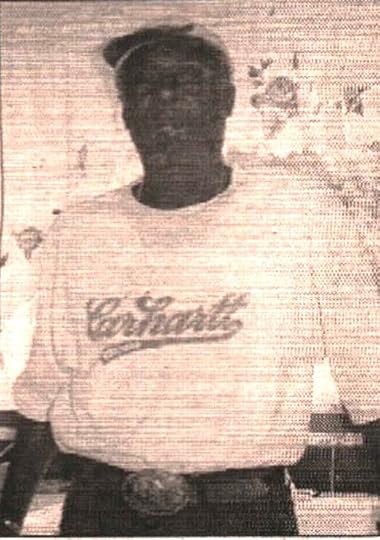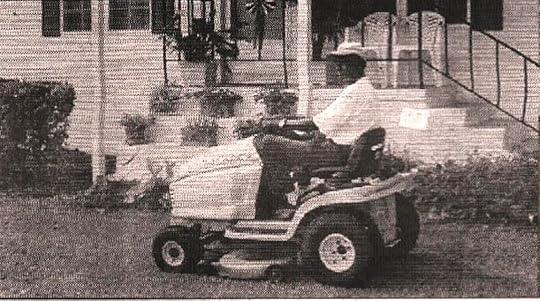A Memorable Interview with Joe Louis Clark
One of the most memorable interviews of my decade-long career as a journalist occurred in August 2003 when I was the editor and reporter for The Observer, a monthly paper published in Alachua County, Florida.
Just minutes from the University of Florida in Gainesville, Florida, a new resident of Newberry caught everyone’s attention, particularly those of the media. Somehow I managed to reach him first and he gave me an exclusive interview.
 Joe Clark, August 2003, in his kitchen on farm in Newberry, Florida – Photo by P.C. Zick
Joe Clark, August 2003, in his kitchen on farm in Newberry, Florida – Photo by P.C. ZickJoe Louis Clark, the former principal from New Jersey who’d been featured in the movie Lean on Me, starring Morgan Freeman as Clark, had moved into rural Alachua County, and he invited me to visit him in his modest home in the country. He was born in Rochelle, Georgia, on May 8, 1938, and he died in Newberry on December 29, 2020. On the day of the interview, we looked out his kitchen window, and he told me something I have never forgotten and try to remember during times of stress. “How did you manage to stay so calm during all the chaos?” I asked. He pointed to the center of his forehead. “As long as I remain centered in here, the rest is just noise around me. That’s the key. I know who I am there.”
I apologize for the quality of the photos I took the day of the interview. I no longer have the originals, so they are scanned from the article. Here’s the article in its entirety.
“Joe Clark Looks in the Mirror and Enjoys the View”
What do Socrates, Jesus, Shakespeare, Martin Luther King, and Ronald Reagan have in common?
No joke line here. These men have all inspired maverick Joe Clark, the principal from New Jersey whose miracles appear on film in the 1988 movie Lean on Me.
Wielding a baseball bat to bring Eastside High School in Patterson, NJ, under control brought national attention to Newberry resident, Joe Clark.
The image of Clark with the bat belies the character of this man who, despite walking into the middle of havoc and creating a bit of it himself, lives his life in harmony with his beliefs and actions.
He believes life is all about the mirror concept—looking in the mirror and liking the reflection. As he reflects on his philosophy, he slips Shakespeare into the conversation.
“I believe in the quote from Hamlet. ‘This above all—to thine own self be true, And it must follow, as the night the day, thou canst not then be false to any man.’”
But that is not the only reason Shakespeare inspired him. He remembers back to his sophomore year in high school. It was in an English class that “an old buxom Irish woman with red hair, named Betty Sullivan,” gave him the lofty idea of going to college.
“I was poor, and I didn’t have a lot of things that other kids had, but I always did my homework,” Clark remembered. “Sometimes I’d go to the library because our lights were out, and I’d read. One day in class Miss Sullivan asked a question about Shakespeare.
“She asked an all-state football player the question, and he did not know the answer,” he said. “She asked, ‘Does anyone know the answer?’
“I looked around and no one’s had was up, so I raised my hand and gave her the correct answer. She said, ‘I wish everybody in this classroom was like Joey.’ Then she said to this big six foot four inch football player, ‘You big dummy, go stand there until you become like Joey.’
“I was on cloud nine!”
He ended up as an all A student and worked nights to pay for his way through college. He did not receive financial aide, but he ended up graduating from a state college in New Jersey.
Now Clark owns a small farm on the outskirts of Newberry and a house in Gainesville. However, he spends most of his time on the farm because it “allows me time to reflect.”

He came here because of his children who attended the University of Florida and found he liked the area enough to call it home. He officially retired in February 2003, but that does not mean he sits around the house doing nothing. He travels to colleges and corporations around the country 15 to 20 times per year getting his message across. The rest of the time he devotes to his farm in Newberry with its immaculate lawn, gardens, and four horses.
The career of Joe Clark follows a pattern of taking jobs no one else could do. He thrives on being the “galvanizing force to do unorthodox things that I could not do if I were in any situation that was less tumultuous.”
He spent eight years at Eastside High School where almost immediately he turned “a cauldron of violence to an orderly and safe, clean school with parents who knew they could send them to a school of 3,500 students, and they were not going to come home shot or stabbed or beaten up.
Clark also knew he could not fail at this job, and he put his whole harmonious being into the clean-up of that school.
“I knew that if I failed in my mission, and I knew I would not, that I would become the assistant superintendent because all the other principals who failed became assistant superintendents.
“But if I succeeded, I would be catapulted into the arena as an American folk hero.”
And that is just what happened, and he can use that status to get his message across to students, parents, teachers, and others.
“I cater to people—black, white, polka-dotted, people are people. I don’t care about your religion, ethnicity, race,” Clark said. “I am motivated and stimulated by one thing: your character.”
He believes adamantly that we have failed as a people by not stressing character, virtues, and values to the children.
“As educators, I believe we have eluded the primary purpose of our task and goals of inculcating values and virtues into the lives of our children,” Clark explained.
“We have become more concerned with passing out prophylactics or bussing or working the lunchroom.”
He believes that if children are not taught the basic values of justice and mercy, then no matter “how gilded our streets, or how raised with alabaster they may be, the American experience will fail.”
His philosophy has come from many sources, but he credits some heavy weights as his main inspiration.
“I borrowed from Socrates, stole some from Dr. King, and a lot of Jesus,” Clark said. “And I say if you don’t like me, don’t blame me, blame them.”
That just leaves Ronald Reagan. His tory of President Reagan explains the defining moment in his political development.
He was walking around the corridors of Eastside High School when his secretary told him that the President of the United States was on the phone for him.
“I said to her, ‘The President of the United States is on the phone?’” he remembered. “I know now that there is vodka in that orange juice you drink every day. The President of the United States is not calling me.”
The secretary persisted, and Clark was in “a state of apoplectic rage. “I was livid” with his secretary for playing such a trick on him.
“I picked up that phone and said, ‘Who is it? What do ya want?’ And the voice on the other side said, ‘Is this Principal Clark?’
He responded gruffly that it was. Then a soft voice said, “’This is President Ronal Reagan, and Principal Clark, I just saw you on Ted Koppel’s Nightline, and I want to commend you for a job well done.’
“My eyes dangled from my optic nerves, and I became an instantaneous Republican,” concluded Clark.
Since then, he has visited the White House more than 15 times and spoken to diplomats and senators, and basically had “a remarkable encounter with Washington.”
As emphatic as Clark can become when preaching his message, he becomes serious and quiet when he talks about his achievements in life.
“My children,” he said quietly, “are my greatest achievement in life. All the rest pales in comparison.
“Forget about the movie, the book, the speaking engagements around the country, and Presidential citations,” he said. “The greatest achievement that has been bestowed upon this mere compilation of finite mortality is the fact that my children are good solid Americans.
“The rest is virtually irrelevant in comparison to my children. That’s it for me.”
The movie Lean on Me is available on the following streaming platforms.
Amazon Prime Video – rent for $3.79; Apple TV – fee required; Google Play – rent for $3.79

FREE – Click here to download your Kindle copy of samples from P.C. Zick’s romances.



